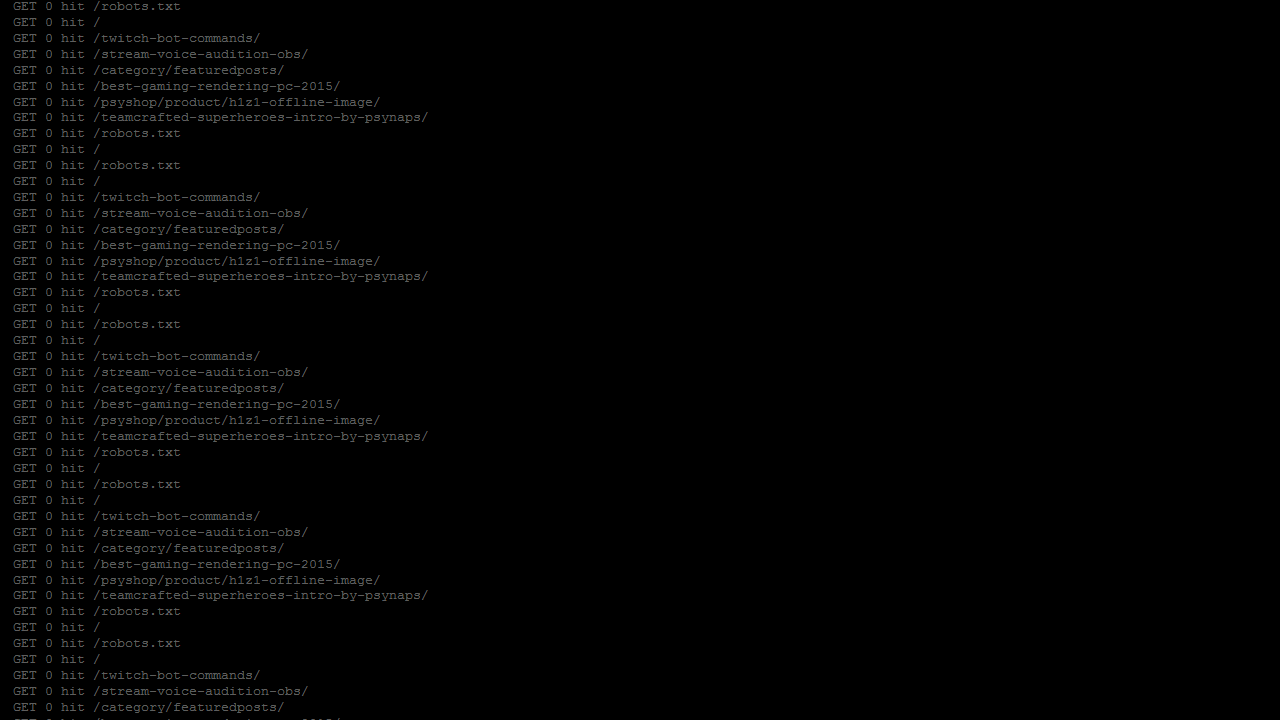Varnish 4 Example with Apache, WordPress, Woocommerce, Memberships, and more.
It was a long journey to get a working Varnish 4.0 to behave with WordPress and all of its dynamic plugins (such as Paid Memberships Pro PMP, Woocommerce, WordPress Social Login, etc), however the journey is not over…yet. I found myself scattered around the internet looking for resources about Varnish and the various scripts I am using. Thus I decided to write this guide and share my Varnish example. I am adding my experience here in hopes I can get feedback from you, the pros and beginners, and hopefully help some people along the way. In terms of Varnish performance and optimization, my goal is to achieve a decent hit rate on static content while leaving dynamic member content dynamic. Cheers!
Subscribe to Psynaps YouTube Watch Psynaps Live on Twitch
About my setup
I am running 5+ wordpress sites on the same server, each with WP Super Cache. I am finding that this config, along with WP Super Cache is making my website very fast (try it www.psynapticmedia.com).
This will work well for multisite, as I am running multiple wordpress sites and each one has a different need for cookie management. For example, I want my blog to be more static and have a high hit rate, however I want my members site to be more dynamic as each member will have a unique session. Of course I want my woocommerce shop to be functional so sales can be processed. You will see the “do not cache” area and the cookie madness below that makes this possible.
A working default.vcl
(updated 06-14-15)
1 2 3 4 5 6 7 8 9 10 11 12 13 14 15 16 17 18 19 20 21 22 23 24 25 26 27 28 29 30 31 32 33 34 35 36 37 38 39 40 41 42 43 44 45 46 47 48 49 50 51 52 53 54 55 56 57 58 59 60 61 62 63 64 65 66 67 68 69 70 71 72 73 74 75 76 77 78 79 80 81 82 83 84 85 86 87 88 89 90 91 92 93 94 95 96 97 98 99 100 101 102 103 104 105 106 107 108 109 110 111 112 113 114 115 116 117 118 119 120 121 122 123 124 125 126 127 128 129 130 131 132 133 134 135 136 137 138 139 140 141 142 143 144 145 146 147 148 149 150 151 152 153 154 155 156 157 158 159 160 161 162 163 164 165 166 167 168 169 170 171 172 173 174 175 176 177 178 179 180 181 182 183 184 185 186 187 188 189 190 191 192 193 194 195 196 197 198 199 200 201 202 203 204 205 206 207 208 209 210 211 212 213 214 215 216 217 218 219 220 221 222 223 224 225 226 227 228 229 230 231 232 233 234 235 236 237 238 239 240 241 242 243 244 245 246 247 248 249 250 251 252 253 254 255 256 257 258 259 260 261 262 263 264 265 266 267 268 269 270 271 272 273 274 275 276 277 278 279 280 281 282 283 284 285 286 287 288 289 290 291 292 293 294 295 296 297 298 299 300 301 302 303 304 305 306 307 308 309 310 311 312 313 314 315 316 317 318 319 320 321 322 323 324 325 326 327 328 329 330 331 332 333 334 335 336 337 338 339 340 341 342 343 344 345 346 347 348 349 350 351 352 353 354 355 356 357 358 359 360 361 362 363 364 365 366 367 368 369 370 371 372 373 374 375 376 377 378 379 380 381 382 383 384 385 386 387 388 389 390 391 392 393 394 395 396 397 398 399 400 401 402 403 404 405 406 407 408 409 410 411 412 413 414 415 416 417 418 419 420 421 422 423 424 425 426 427 | # The Psynaptic Media Varnish Config by Psynaps # Based on many templates including # https://github.com/mattiasgeniar/varnish-4.0-configuration-templates/blob/master/default.vcl vcl 4.0; import std; import directors; backend server1 { .host = "127.0.0.1"; # IP or Hostname of backend .port = "8080"; # Port Apache or whatever is listening .max_connections = 800; # That's it .first_byte_timeout = 300s; # How long to wait before we receive a first byte from our backend? .connect_timeout = 300s; # How long to wait for a backend connection? .between_bytes_timeout = 300s; # How long to wait between bytes received from our backend? } # Only allow purging from specific IPs acl purge { "localhost"; "127.0.0.1"; "104.131.26.178"; # eth0 "10.132.122.116"; # eth1 "psynapticmedia.com"; } sub vcl_init { # Called when VCL is loaded, before any requests pass through it. Typically used to initialize VMODs. new vdir = directors.round_robin(); vdir.add_backend(server1); #vdir.add_backend(server2); #vdir.add_backend(server3); } sub vcl_recv { # Called at the beginning of a request, after the complete request has been received and parsed. # Its purpose is to decide whether or not to serve the request, how to do it, and, if applicable, # which backend to use. # also used to modify the request # send all traffic to the vdir director set req.backend_hint = vdir.backend(); # TURN OFF CACHE when needed (just uncomment this only when needed) # return(pass); # Allow purging from ACL if (req.method == "PURGE") { if (!client.ip ~ purge) { return(synth(405,"Not allowed.")); } return (purge); } # Normalize the header, remove the port (in case you're testing this on various TCP ports) set req.http.Host = regsub(req.http.Host, ":[0-9]+", ""); # set or append the client.ip to X-Forwarded-For header. Important for logging and correct IPs. if (req.restarts == 0) { if (req.http.X-Forwarded-For) { set req.http.X-Forwarded-For = req.http.X-Forwarded-For + ", " + client.ip; } else { set req.http.X-Forwarded-For = client.ip; } } ### ### Do not Cache: special cases ### # Do not cache AJAX requests. if (req.http.X-Requested-With == "XMLHttpRequest") { return(pass); } # Post requests will not be cached if (req.http.Authorization || req.method == "POST") { return (pass); } # Only cache GET or HEAD requests. This makes sure the POST requests are always passed. #if (req.method != "GET" && req.method != "HEAD") { # return (pass); #} # Dont Cache Wordpress post pages and edit pages if (req.url ~ "(wp-admin|post\.php|edit\.php|wp-login)") { return(pass); } if (req.url ~ "/wp-cron.php" || req.url ~ "preview=true") { return (pass); } # Woocommerce if (req.url ~ "(cart|my-account|checkout|addons)") { return (pass); } if ( req.url ~ "\?add-to-cart=" ) { return (pass); } # Paid memberships Pro PMP if ( req.url ~ "(membership-account|membership-checkout)" ) { return (pass); } # Wordpress Social Login Plugin. Note: Need to develop this. Please share if you have an example. if (req.url ~ "(wordpress-social-login|wp-social-login)") { return (pass); } # WP-Affiliate if ( req.url ~ "\?ref=" ) { return (pass); } # phpBB Logged in users and ACP if ( req.url ~ "(/forumPM/adm/|ucp.php?mode=|\?mode=edit)" ) { return (pass); } ### ### http header Cookie ### Remove some cookies (if found) ### Cache This Stuff ### # https://www.varnish-cache.org/docs/4.0/users-guide/increasing-your-hitrate.html#cookies ### COOKIE MADNESS. # Remove the "has_js" cookie set req.http.Cookie = regsuball(req.http.Cookie, "has_js=[^;]+(; )?", ""); # Remove any Google Analytics based cookies set req.http.Cookie = regsuball(req.http.Cookie, "__utm.=[^;]+(; )?", ""); set req.http.Cookie = regsuball(req.http.Cookie, "_ga=[^;]+(; )?", ""); set req.http.Cookie = regsuball(req.http.Cookie, "utmctr=[^;]+(; )?", ""); set req.http.Cookie = regsuball(req.http.Cookie, "utmcmd.=[^;]+(; )?", ""); set req.http.Cookie = regsuball(req.http.Cookie, "utmccn.=[^;]+(; )?", ""); # Remove the Quant Capital cookies (added by some plugin, all __qca) set req.http.Cookie = regsuball(req.http.Cookie, "__qc.=[^;]+(; )?", ""); # Remove the wp-settings-1 cookie set req.http.Cookie = regsuball(req.http.Cookie, "wp-settings-1=[^;]+(; )?", ""); # Remove the wp-settings-time-1 cookie set req.http.Cookie = regsuball(req.http.Cookie, "wp-settings-time-1=[^;]+(; )?", ""); # Remove the wp test cookie set req.http.Cookie = regsuball(req.http.Cookie, "wordpress_test_cookie=[^;]+(; )?", ""); # Remove the phpBB cookie. This will help us cache bots and anonymous users. set req.http.Cookie = regsuball(req.http.Cookie, "style_cookie=[^;]+(; )?", ""); set req.http.Cookie = regsuball(req.http.Cookie, "phpbb3_psyfx_track=[^;]+(; )?", ""); # Remove the cloudflare cookie set req.http.Cookie = regsuball(req.http.Cookie, "__cfduid=[^;]+(; )?", ""); # Remove the PHPSESSID in members area cookie set req.http.Cookie = regsuball(req.http.Cookie, "PHPSESSID=[^;]+(; )?", ""); # Are there cookies left with only spaces or that are empty? if (req.http.cookie ~ "^\s*$") { unset req.http.cookie; } # MEGA DROP. Drop ALL cookies sent to WordPress, except those originating from the URLs defined. # This increases HITs significantly, but be careful it can also break plugins that need cookies. # Note: The /members/ directory had problems with PMP login and social login plugin. # Adding it to the exclude list here (and including it below in the "Retain cookies" list) fixed login. # This works better than than other cookie removal examples found on varnish's website. # Note phpBB directory (forumPM) also passes cookies here. if (!(req.url ~ "(wp-login|wp-admin|cart|my-account|checkout|addons|wordpress-social-login|wp-login\.php|forumPM|members)")) { unset req.http.cookie; } # Normalize the query arguments. # Note: Placing this above the "do not cache" section breaks some WP theme elements and admin functionality. set req.url = std.querysort(req.url); # Large static files are delivered directly to the end-user without # waiting for Varnish to fully read the file first. # Varnish 4 fully supports Streaming, so see do_stream in vcl_backend_response() to witness the glory. if (req.url ~ "^[^?]*\.(mp[34]|rar|tar|tgz|wav|zip|bz2|xz|7z|avi|mov|ogm|mpe?g|mk[av])(\?.*)?$") { unset req.http.Cookie; return (hash); } # Cache all static files by Removing all cookies for static files # Remember, do you really need to cache static files that don't cause load? Only if you have memory left. # Here I decide to cache these static files. For me, most of them are handled by the CDN anyway. if (req.url ~ "^[^?]*\.(bmp|bz2|css|doc|eot|flv|gif|ico|jpeg|jpg|js|less|pdf|png|rtf|swf|txt|woff|xml)(\?.*)?$") { unset req.http.Cookie; return (hash); } # Cache all static files by Removing all cookies for static files - These file extensions are generated by WP Super Cache. if (req.url ~ "^[^?]*\.(html|htm|gz)(\?.*)?$") { unset req.http.Cookie; return (hash); } # Do not cache Authorized requests. if (req.http.Authorization) { return(pass); } # Cache all others requests. # Note Varnish v4: vcl_recv must now return hash instead of lookup return (hash); } sub vcl_pipe { # Called upon entering pipe mode. # In this mode, the request is passed on to the backend, and any further data from both the client # and backend is passed on unaltered until either end closes the connection. Basically, Varnish will # degrade into a simple TCP proxy, shuffling bytes back and forth. For a connection in pipe mode, # no other VCL subroutine will ever get called after vcl_pipe. # Note that only the first request to the backend will have # X-Forwarded-For set. If you use X-Forwarded-For and want to # have it set for all requests, make sure to have: # set bereq.http.connection = "close"; # here. It is not set by default as it might break some broken web # applications, like IIS with NTLM authentication. # set bereq.http.Connection = "Close"; return (pipe); } sub vcl_pass { # Called upon entering pass mode. In this mode, the request is passed on to the backend, and the # backend's response is passed on to the client, but is not entered into the cache. Subsequent # requests submitted over the same client connection are handled normally. # return (pass); } # The data on which the hashing will take place sub vcl_hash { # Called after vcl_recv to create a hash value for the request. This is used as a key # to look up the object in Varnish. hash_data(req.url); if (req.http.host) { hash_data(req.http.host); } else { hash_data(server.ip); } # hash cookies for requests that have them if (req.http.Cookie) { hash_data(req.http.Cookie); } # If the client supports compression, keep that in a different cache if (req.http.Accept-Encoding) { hash_data(req.http.Accept-Encoding); } return (lookup); } # Handle the HTTP request coming from our backend sub vcl_backend_response { # Called after the response headers has been successfully retrieved from the backend. # Sometimes, a 301 or 302 redirect formed via Apache's mod_rewrite can mess with the HTTP port that is being passed along. # This often happens with simple rewrite rules in a scenario where Varnish runs on :80 and Apache on :8080 on the same box. # A redirect can then often redirect the end-user to a URL on :8080, where it should be :80. # This may need fine tuning on your setup. # To prevent accidental replace, we only filter the 301/302 redirects for now. if (beresp.status == 301 || beresp.status == 302) { set beresp.http.Location = regsub(beresp.http.Location, ":[0-9]+", ""); } ### ### Overall TTL ### Note: The TTL is designed to be somewhat aggressive here, to keep things in cache. ### # Lets get this party started. # This will keep things in cache longer if (beresp.ttl > 0s) { unset beresp.http.expires; set beresp.http.cache-control = "max-age=900"; set beresp.ttl = 4d; # how long you cache objects set beresp.http.magicmarker = "1"; } # Allow stale content, in case the backend goes down. # make Varnish keep all objects for x hours beyond their TTL set beresp.grace = 12h; ### ### Static Files ### # Enable cache for all static files # Monitor your cache size, if you get data nuked out of it, consider giving up the static file cache. # More reading here: https://ma.ttias.be/stop-caching-static-files/ if (bereq.url ~ "^[^?]*\.(bmp|bz2|css|doc|eot|flv|gif|ico|jpeg|jpg|js|less|mp[34]|pdf|png|rar|rtf|swf|tar|tgz|txt|wav|woff|xml|zip)(\?.*)?$") { set beresp.ttl = 2d; # set a TTL for these optional. unset beresp.http.set-cookie; } # Cache all static files by Removing all cookies for static files - Note: These file extensions are generated by Wordpress WP Super Cache. if (bereq.url ~ "^[^?]*\.(html|htm|gz)(\?.*)?$") { set beresp.ttl = 1d; # set a TTL for these optional. unset beresp.http.set-cookie; } ### ### Targeted TTL ### # Members section is very dynamic and uses cookies (see cookie settings in vcl_recv). if (bereq.url ~ "/members/") { set beresp.ttl = 2d; } # My Shop section is fairly static when browsing the catalog, but woocommerce is passed in vcl_recv. if (bereq.url ~ "/psyshop/") { set beresp.ttl = 1d; } # phBB Forum # Note: Cookies are dropped for phpBB in vcl_recv which disables the forums cookies, however, logged in users still get a hash. # I set the anonymous user as a bot in phpBB admin settings. As bots dont use cookies, this gives 99% hit rate. if (bereq.url ~ "/forumPM/") { set beresp.ttl = 2h; } # Long ttl sites if (bereq.url ~ "(example.com|example2.com)") { set beresp.ttl = 1w; } # Large static files are delivered directly to the end-user without # waiting for Varnish to fully read the file first. # Varnish 4 fully supports Streaming, so use streaming here to avoid locking. # I do not stream large files from my server, I use a CDN or dropbox, so I have not tested this. if (bereq.url ~ "^[^?]*\.(mp[34]|rar|tar|tgz|wav|zip|bz2|xz|7z|avi|mov|ogm|mpe?g|mk[av])(\?.*)?$") { unset beresp.http.set-cookie; set beresp.do_stream = true; # Check memory usage it'll grow in fetch_chunksize blocks (128k by default) if the backend doesn't send a Content-Length header, so only enable it for big objects set beresp.do_gzip = false; # Don't try to compress it for storage } # don't cache response to posted requests or those with basic auth if ( bereq.method == "POST" || bereq.http.Authorization ) { set beresp.uncacheable = true; set beresp.ttl = 120s; return (deliver); } return (deliver); } # The routine when we deliver the HTTP request to the user # Last chance to modify headers that are sent to the client sub vcl_deliver { # Called before a cached object is delivered to the client. if (obj.hits > 0) { # Add debug header to see if it's a HIT/MISS and the number of hits, disable when not needed set resp.http.X-Cache = "HIT"; } else { set resp.http.X-Cache = "MISS"; } # Please note that obj.hits behaviour changed in 4.0, now it counts per objecthead, not per object # and obj.hits may not be reset in some cases where bans are in use. See bug 1492 for details. # So take hits with a grain of salt set resp.http.X-Cache-Hits = obj.hits; # Remove some headers: PHP version unset resp.http.X-Powered-By; # Remove some headers: Apache version & OS unset resp.http.Server; unset resp.http.X-Drupal-Cache; unset resp.http.X-Varnish; unset resp.http.Age; unset resp.http.Via; unset resp.http.Link; unset resp.http.X-Generator; if (resp.http.magicmarker) { unset resp.http.magicmarker; set resp.http.age = "0"; } return (deliver); } sub vcl_synth { if (resp.status == 720) { # We use this special error status 720 to force redirects with 301 (permanent) redirects # To use this, call the following from anywhere in vcl_recv: return (synth(720, "http://host/new.html")); set resp.http.Location = resp.reason; set resp.status = 301; return (deliver); } elseif (resp.status == 721) { # And we use error status 721 to force redirects with a 302 (temporary) redirect # To use this, call the following from anywhere in vcl_recv: return (synth(720, "http://host/new.html")); set resp.http.Location = resp.reason; set resp.status = 302; return (deliver); } return (deliver); } sub vcl_fini { # Called when VCL is discarded only after all requests have exited the VCL. # Typically used to clean up VMODs. return (ok); } |
Whats missing?
– WordPress Purge needs to be implemented and tested.
– Smarter grace period.
– Others? Leave me your comments!
How to watch the magic
In the console, check your HIT and MISS. -w 10 refreshes every 10 seconds
1 | varnishstat -w 10 |
Realtime log for troubleshooting.
1 | varnishncsa -F "%m %T %{Varnish:handling}x %U" |
Helpful Resources and Examples
https://github.com/mattiasgeniar/varnish-4.0-configuration-templates
https://wordpress.org/support/topic/good-varnish-4-defaultvcl
https://gist.github.com/nadirlc/46987b42447cf8e3be79










Josh Johnson liked this on Facebook.
Alex Macpherson liked this on Facebook.
Wow, this worked, thank you so much for this. Was pulling my hair out since every time I added a product to cart it would remove it. Nice work!
Hi there,
your Vlc is working well about no Error, i mean a see no different About the Caching and Response Time.
I need a Solution for the “Leverage browser caching” and the “request size” of my Page.
You have a idea?
cheers
Manuel
HI,
Thank you for this great VCL. I am using WC3 Total Cache. It seems I am unable to purge the varnish cache. I noticed in your final comments “Whats missing” you said; WordPress Purge needs to be implemented and tested.. Have you had any feed back on this function? Thank you for your valued time.